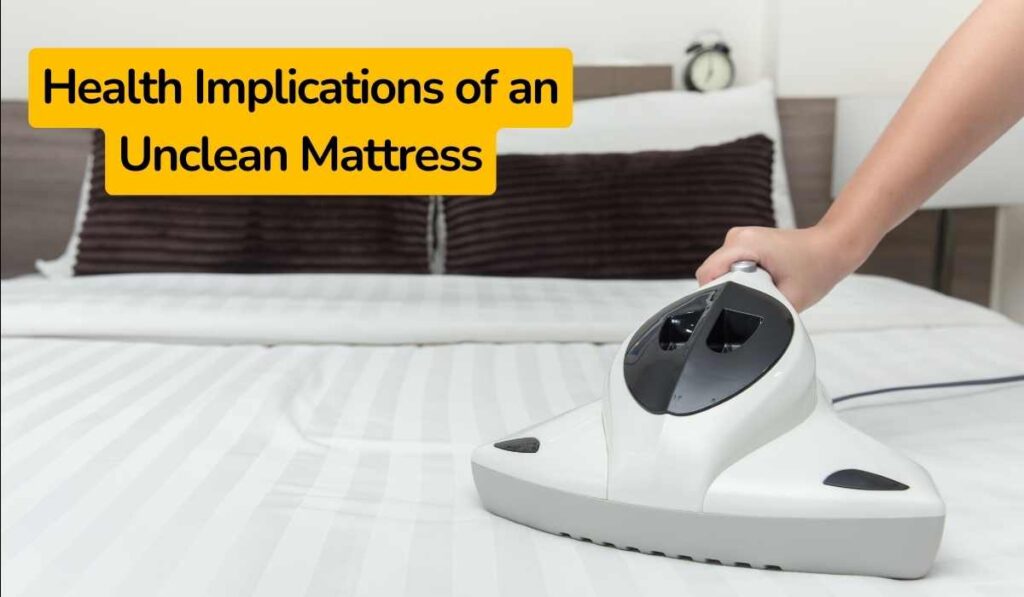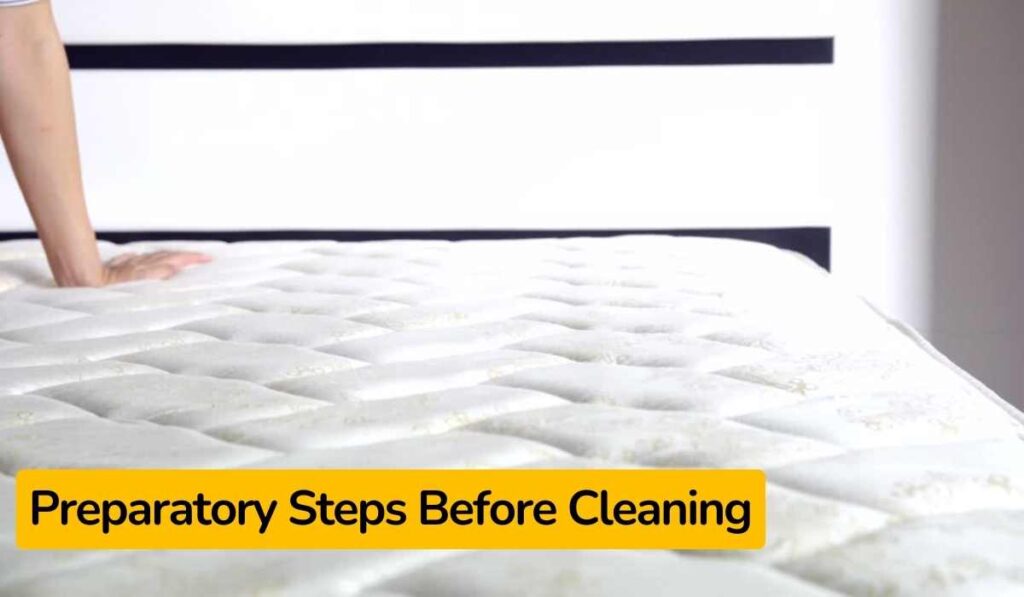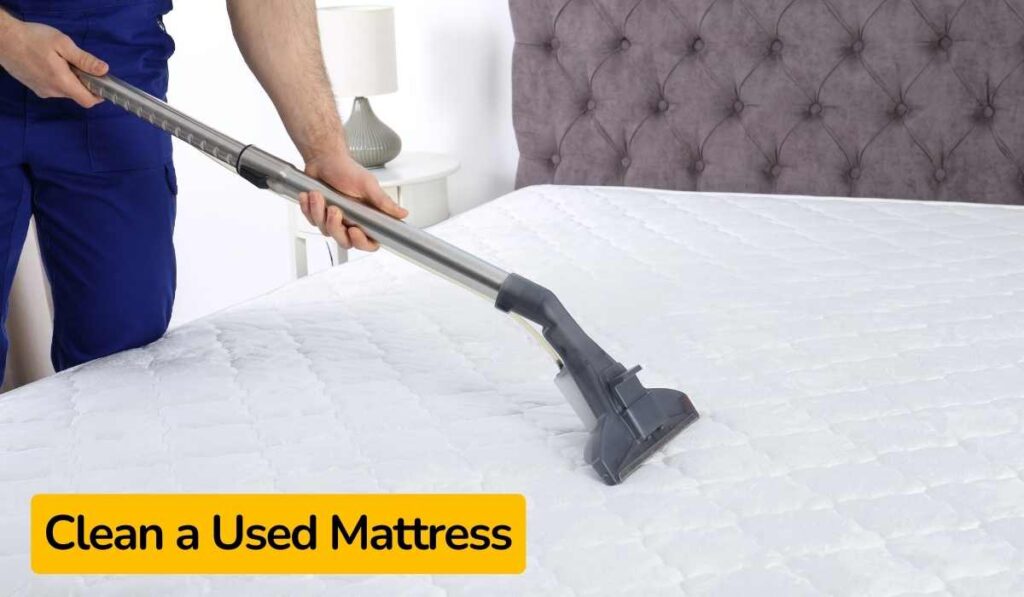Discover the essentials of mattress cleaning with this informative guide on refreshing used mattresses for a healthier sleep environment. Our step-by-step process demystifies the task, ensuring your bed is spotless and allergen-free.
Understanding the Importance of Cleaning a Used Mattress
A clean mattress is key to maintaining a healthy sleep environment. Dirt, sweat, and allergens can build up over time, affecting sleep quality and general health. A clean mattress is essential for good hygiene and wellbeing.
Health Implications of an Unclean Mattress
An unclean mattress can harbor dust mites, allergens, and bacteria, leading to allergies, asthma, and skin irritation. Regular cleaning reduces these risks and promotes a healthier sleep.
Assessing the Condition of a Used Mattress

Bringing a used mattress into your home requires a thorough check-up. Identify issues early to save yourself from future discomfort and costly problems.
Initial Inspection for Stains and Damage
Start your mattress makeover with a detailed examination. Look for visible signs of wear or mishandling, covering all parts of the mattress.
| Issues to Check | What to Look For |
|---|---|
| Surface Stains | Mark any discoloration or spots. |
| Tears or Rips | Note fabric or seam damage. |
| Indentations | Feel for uneven distribution or sagging areas. |
| Odors | Sniff out musty or foul smells indicating hidden issues. |
Checking for Signs of Bed Bugs and Other Pests
Pest infestation, especially bed bugs, is a serious concern with any used mattress. Observe closely along seams, crevices, and any tags or buttons.
| Signs of Pests | What to Look For |
|---|---|
| Bed Bugs | Small rust-colored stains, visible bugs, eggs. |
| Dust Mites | Invisible; look for signs of allergies when testing. |
| Other Insects | Feces, shed skins, live insects. |

Preparatory Steps Before Cleaning
A good night’s sleep starts with a clean mattress. Before diving into scrubbing and stain removal, prepare properly to ensure a deep and effective clean.
Gathering Necessary Cleaning Supplies
Assemble all the cleaning tools you’ll need:
- Vacuum cleaner with an upholstery attachment
- Mild detergent
- Baking soda for odor removal
- White vinegar in a spray bottle
- Clean cloths
- Bucket of warm water
- Optional: enzyme cleaner or stain remover for tough spots
Removing Bedding and Vacuuming the Surface
- Remove all bedding items and wash them following fabric care instructions.
- Vacuum the entire mattress surface, paying special attention to seams and crevices where dust and debris accumulate.
Deodorizing the Mattress
Say goodbye to smells with effective deodorizing techniques.
Natural Vs. Chemical Deodorizers
Choose between natural and chemical deodorizers. Consider their benefits and potential considerations.
| Deodorizer Type | Benefits | Considerations |
|---|---|---|
| Natural | Eco-friendly, gentle | May require repeated use |
| Chemical | Strong, fast-acting | Potential for irritation |
Application Techniques for a Fresh Scent
Proper application ensures a fresh scent. Follow these steps:
- Strip the mattress and use a vacuum to remove debris.
- Sprinkle deodorizer evenly if using powders.
- For sprays, hold the bottle 6 inches away from the mattress.
- Let the deodorizer sit, varying time frames by product.
- Vacuum again if necessary and aerate the mattress for optimal freshness.
How do I clean a second hand mattress?
Cleaning a second-hand mattress is a straightforward process that ensures a fresh and healthy sleeping environment. To start, strip the bed of all bedding and wash these items following fabric care instructions.
Begin by vacuuming the entire mattress surface using an upholstery attachment, paying special attention to seams and crevices where dust and debris accumulate
Can old mattress be cleaned?
Certainly, old mattresses can be cleaned with proper care and attention. While the cleaning process may require more effort for deeply embedded dirt or stains, it is entirely possible to refresh and revitalize an old mattress.
Vacuuming the surface, spot-cleaning stains with a mild detergent solution, and using deodorizers like baking soda can significantly improve the cleanliness. Deep cleaning techniques such as steam cleaning or enzyme cleaners can also be employed for a thorough wash.
Regular maintenance, including flipping and rotating, can contribute to the overall hygiene of an old mattress.
Deep Cleaning Techniques
Cleaning a used mattress goes beyond surface cleaning. Over time, deep cleaning becomes vital for health and comfort.
Steam Cleaning for a Thorough Wash
Sanitize and refresh your mattress with steam cleaning:
- Vacuum the mattress to remove loose particles.
- Pre-treat stains with a spot cleaner.
- Use a dry steam cleaner filled with distilled water to avoid calcification.
- Move the cleaner across the mattress surface, focusing on small sections at a time.
- Let the mattress dry completely in a well-ventilated area before covering it with sheets.
Using an Enzyme Cleaner for Organic Matter
Target organic matter with enzyme cleaners:
- Spot-test the cleaner on a hidden area.
- Dab the cleaner onto stains using a cloth without saturating the mattress.
- Let the enzyme cleaner sit for the recommended time.
- Blot the area with a clean, dry cloth to lift residue.
- Air out the mattress to eliminate any leftover smell.
Handling Structural Issues
Ensure a comfortable and supportive mattress by addressing structural issues:
Flipping and Rotating the Mattress
Keep wear even by flipping the mattress every six months and rotating it head to toe simultaneously. Check the manufacturer’s advice for specific recommendations.
Reinforcing Edge Support
Address soft edges by:
- Adding a bed frame with strong edges.
- Using a high-quality mattress topper for better support.
- Trying edge support products designed for mattresses.
Firm edges mean better support and a longer-lasting mattress.
After Cleaning Care
Maintain the freshness and longevity of your mattress by following these crucial steps:
Ensuring Proper Ventilation to Dry
- Place the mattress in a well-ventilated area with good airflow.
- Use fans or open windows to increase circulation.
- Allow the mattress to dry completely before use.
Protecting the Mattress with a Mattress Protector
After drying, invest in a mattress protector to safeguard against dust mites, spills, and stains.
- Choose a breathable protector to maintain air circulation.
- Ensure it fits snugly around the mattress without bunching.
Preventing Future Stains and Contamination
Maintain the cleanliness of your mattress with practical tips:
Regular Maintenance Tips
- Vacuum your mattress monthly to remove dust and allergens.
- Use a washable mattress cover for easy cleaning.
- Rotate your mattress every three months to prevent wear.
- Avoid eating in bed to reduce the risk of crumbs and spills.
- Expose your mattress to sunlight periodically to combat moisture.
Best Practices for Mattress Hygiene
| Action | Benefit |
|---|---|
| Immediate Stain Treatment | Prevents lasting damage. |
| Using Protective Barriers | Shields against spills and dust mites. |
| Baking Soda for Freshness | Neutralizes odors naturally. |
| Professional Cleaning | Deep cleans for hygiene and longevity. |
Structure your routine around these best practices to foster a clean, healthy rest space, ensuring a longer-lasting mattress for years to come.
Addressing Health Considerations
Refreshing a used mattress is not just about removing stains and odors; it’s also about your health.


